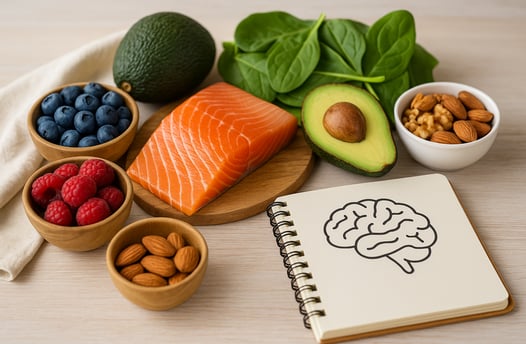Eating for the Mind: How Nutrition Can Boost Mental Health Naturally
Discover how your diet affects your mental health. Learn science-backed nutritional strategies to support better mood, manage anxiety, and boost brain function naturally through smart food choices.
5/5/20253 min read


Eating for the Mind: Nutritional Approaches to Enhance Mental Health
When we think about nutrition, most of us immediately associate it with physical health — stronger muscles, better heart function, or a leaner body. But what we eat doesn't just affect our bodies; it deeply influences our minds too. While the connection between diet and physical health is widely recognized, the role of nutrition in mental health — especially in managing conditions like anxiety, depression, and mood disorders — is only recently getting the attention it deserves.
The Gut-Brain Connection: Your Second Brain
One of the most fascinating discoveries in recent years is the gut-brain axis — the complex communication network linking our digestive system to our brain. Scientists now refer to the gut as the "second brain" because it produces about 90% of the body's serotonin, a neurotransmitter that plays a key role in mood regulation.
An unhealthy diet can disrupt the gut microbiota — the trillions of bacteria living in our intestines — leading to inflammation, imbalanced neurotransmitter production, and worsening mental health symptoms. Conversely, feeding the gut properly can help stabilize mood, sharpen focus, and even reduce feelings of anxiety.
Key Nutritional Strategies to Boost Mental Health
1. Prioritize Omega-3 Fatty Acids
Omega-3s, found in foods like salmon, walnuts, flaxseeds, and chia seeds, are critical for brain health. They reduce inflammation and promote healthy communication between brain cells. Research shows that low levels of omega-3s are linked to increased rates of depression and cognitive decline.
🛠️ Recommended Tool:
Healthy fats like Omega-3s play a huge role in brain health and mood regulation.
[Check out this clean, high-quality Omega-3 supplement here] https://amzn.to/4iVMQ2x
2. Focus on a Colorful, Whole Foods Diet
Eating a variety of colorful fruits and vegetables ensures a steady supply of antioxidants. These powerful compounds protect the brain from oxidative stress — a key player in the development of depression and neurodegenerative diseases. Aim for a "rainbow" on your plate: spinach, berries, carrots, beets, and peppers all offer different mental health-boosting benefits.
When life gets busy, it’s not always easy to hit your fruit and veggie goals every single day. That’s where a simple tool like a daily greens powder can help.
🛠️ Recommended Tool:
A daily greens powder can help fill in the gaps and support a healthier gut-brain connection.
[See our favorite daily greens powder here] https://amzn.to/4mbkEM3
3. Support Your Gut with Prebiotics and Probiotics
Prebiotics (fiber-rich foods like garlic, onions, asparagus, and bananas) and probiotics (like yogurt, kefir, sauerkraut, and kimchi) help maintain a balanced gut microbiome. A healthier gut environment can mean better mood stability and less systemic inflammation — both critical for mental well-being.
4. Watch the Sugar and Processed Foods
High-sugar diets and highly processed foods have been linked to increased risk of depression. They cause spikes and crashes in blood sugar levels, which can negatively impact mood and energy. Reducing processed foods and focusing on slow-digesting carbohydrates like oats, quinoa, and legumes can help maintain steady mental energy throughout the day.
5. Ensure Adequate Micronutrients
Deficiencies in key nutrients like vitamin D, B vitamins (especially B6, B12, and folate), magnesium, and zinc are associated with higher risks of mood disorders. A simple blood test can help identify deficiencies. Supplementation or smart food choices — like leafy greens, nuts, eggs, and fortified cereals — can fill in the gaps.
🛠️ Recommended Tool:
Magnesium is one of the most underrated minerals for mental wellness. It helps calm the nervous system and supports better sleep and stress management.
[Explore this easy-to-absorb Magnesium supplement here] https://amzn.to/4jZYIBs
Food is Not a Cure, But It’s a Powerful Tool
While nutrition alone isn't a cure for mental health conditions, it is a powerful and often overlooked tool. Good food choices can complement traditional treatments like therapy and medication, helping to create a stronger, more resilient foundation for mental wellness.
Mental health is complex and personal, but building a diet rich in whole, nourishing foods can be one of the most empowering steps anyone can take toward feeling better — mind, body, and soul.
Because sometimes, healing starts on your plate.
If you are going through something or feeling down, please realize you are not alone.
Reach out to those who love you, or reach out for help.
FITNESS
Nutrition
WellnesS
info@movebetterco.com
© 2025. All rights reserved | Privacy Policy | Terms & Conditions